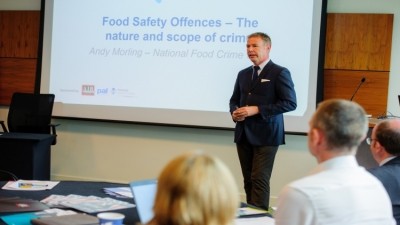FOOD SAFETY CONFERENCE
Food Safety Survey 2018: the results

The British food and drink industry is under tremendous scrutiny of late, with high-profile incidents and recalls grabbing mainstream headlines, as well as social media giving every potential consumer and critic a platform, placing the sector under further pressure.
While the food industry might hope the worst is behind it, the respondents to our Food Safety Survey 2018 certainly don’t feel this is the case. More than two-thirds of those surveyed (68.3%) feel that food fraud is a growing problem in the UK food and drink supply chain, up from 62.7% in last year’s survey.
Someone else’s problem
While most express concern that fraud is a growing issue, the majority of respondents (81.1%) believe their own traceability systems are fit for purpose in the event of a serious product recall, while 73.8% believe that a culture of food safety and hygiene practice permeates their company, from the boardroom to the shop floor. Just over a third (34%) of those surveyed admit that food safety is sometimes compromised at their company to ensure production targets and schedules are met, although 16.4% say this only happens on rare occasions.
Most respondents (85.3%) also feel that good records should be rewarded, agreeing that inspections should be targeted at businesses that present greater risks.
It’s all very well recognising that fraud is an issue, but what is being done about it? The Food Standards Agency’s (FSA’s) National Food Crime Unit recently announced that it had been given approval for £4m funding to launch Phase 2 of its initiative, which will quadruple its staffing resources. Part of its remit will be to act on information given to it by industry insiders, something the FSA says it has already had success with, especially in the wake of the Russell Hume meat scandal.
Thankfully, the majority of respondents (72.5%) agree that CCTV should be used in all food and drink factories as a means of monitoring food safety and hygiene practices. This is fortuitous timing, as CCTV is now required in all slaughterhouses and cutting plants – another fallout from a meat scandal, this time at 2 Sisters Food Group. When announced and implemented, it was largely welcomed by the meat industry, many of whom already had a CCTV system in place. However, it remains to be seen if this will be a fraud prevention tool or simply a means to catch businesses out.
If catching businesses out is a priority over creating a culture where people don’t want to commit fraud for enforcement agencies, then they may have their work cut out for them, especially at a local level. Our survey reveals that 71.4% of respondents believe local authority auditors don’t have enough industry understanding to do their jobs effectively. In fairness, this is something Food Crime Unit head Andy Morling admitted to in relation to his department during a talk at this year’s Foodex in April, making whistleblowers even more important to them.
But then again, the FSA might need to up its awareness campaigns in general. Only 40% of respondents are aware of the FSA’s enhanced registration scheme for all food businesses. The same could be said for information on labelling, as 65.5% of respondents say better guidance on shelf-life and date labels would improve food safety for their business and customers.
Safety in technology
As technology in food and drink businesses becomes more sophisticated, so does the type of fraud. Almost three-quarters (73.4%) of respondents express concern about the threat posed by terrorism and cyberterrorism to food safety, also demonstrating that fraud can be malicious to a business rather than accidental or the result of corners being cut.
More positively, though, a similar percentage (73.2%) believe that advanced technologies such as smart or active packaging, the Internet of Things and nanotechnology should play a bigger role in reducing food safety incidents.
Interestingly the much-touted blockchain technology isn’t being seen as the saviour that some predict it to be. Although 43.4% agree that it will strengthen food safety and they plan to explore its benefits further, 48.4% say they are unsure about it, while 8% disagree.
Finally, the pressure to reformulate products is also causing issues. Much has been made of the Soft Drinks Industry Levy and how businesses respond to it, with reformulation a popular, yet potentially troublesome solution. Under half (42.7%) of respondents say that reformulation and the move to clean-label products have caused food safety headaches over the past 12 months, with 39.4% disagreeing and the rest unaware.
Entitled ‘A focus on future law and threats’, Food Manufacture’s Food Safety Conference 2018 was held at etc.venues Maple House, Birmingham. It was sponsored by AIB International, Pal International, and Westgate Factory Dividers.
Please click this link to register your interest for next year’s conference.
Cost & confidence
Several assurances have been made by various Government ministers about food standards and how they will not be at risk once the UK leaves the EU. The message seems to have hit home, with 56% of respondents feeling more confident than they were 12 months ago that UK food safety standards will not be compromised once the Brexit transition period comes to an end.
This sense of assurance doesn’t stretch to UK exports, with 41% of those surveyed claiming they are not confident that clashing EU and UK food safety standards following the Brexit transition will not damage the latter’s export trade.
One common complaint from the food processing industry is the number of audits taking place and the stress they are placing on a business. In the Food Safety Survey, 78.4% of respondents believe the burden of retailer and other third-party hygiene audits has increased in the past 12 months, in terms of their number, time involved and cost, with just 11% disagreeing with this view.
While there are concerns about audit costs, this doesn’t mean businesses are unwilling to pay their way. Just under half (45%) agree that food businesses should absorb more of the cost of ensuring food safety in the UK is properly regulated and policed.















